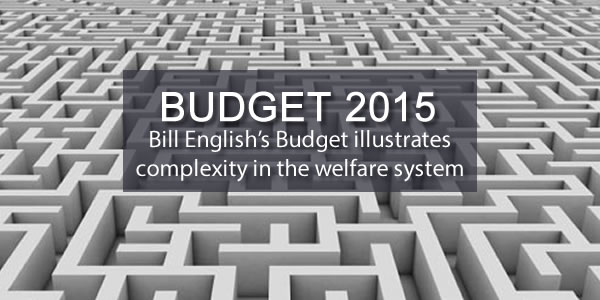Budget 2015 has been touted as a package for the poor. And it certainly delivers them more money. However, it gives with one hand and takes away with the other, revealing the confusing and perverse nature of our welfare system. Ultimately the system itself is broken, and an Unconditional Basic Income is the only answer to this mess.
Bill’s generous Budget shows up our complicated welfare system
The poor have certainly gained from the budget, of that there can be no doubt. This will go a long way to silence the bleating about growing inequality in recent years. Yet even more surprising than this about face is the sheer complexity of the package. Let’s take a look at this summary from Kiwiblog:
- $25 a week net benefit increase for families with children – 1st increase since 1972. An 8.3% increase in the base benefit rate for most on welfare.
- 110,000 beneficiary families with 190,000 children get a net extra $23 a week
- WFF increases for working families earning under $36,350 a year by $12.50 a week, up to $24.50 a week for very low income
- Families on WFF who earn over $88,000 a year get a bit less from WFF as abatement rate increases from 21.25c to 22.5c
- WFF changes benefit 200,000 families and 380,000 children
- 4,000 very low income working families get a net extra $24.50 a week
- 50,000 low income working families get a net extra $21.50 a week
- 150,000 other families get up to $21.50 a week
- Childcare subsidies for low income families up from $4 to $5 an hour. Families eligible for up to 50 hours a week so worth up to $50 a week.
The sheer complexity of this package is mind boggling. Imagine needing to plug those calculations into the IRD’s computers. All the tinkering that has to go on to give poor people more money. No wonder then that people need an advocate to get them
But it’s not all good news
To counter against any incentive to remain on welfare due to higher benefit levels, work testing for sole parents to start when youngest child is three, down from five. The work testing obligation increases from 15 to 20 hours a week. Sole parents need to reapply for the benefit every year, as do job seekers.
This illustrates the issue with our benefit system – the way it is designed effectively discourages work and traps people in poverty. So if the Government offers people in poverty some help in the form of more money, they have to make the stick bigger to make sure they are cajoled back into work.
The result is a complicated mess that stigmatises beneficiaries, costs money and ultimately doesn’t work. Unless of course you count the thousands of bureaucrats this system employs trying to make it work.
Our answer – an Unconditional Basic Income
Rather than this complicated mess, the Morgan Foundation suggests we should have an Unconditional Basic Income. This idea was set out in our book The Big Kahuna. Everyone would receive this, and wouldn’t lose it when you went back to work. It would make a huge difference to many people’s lives. People would always have an incentive to improve their lives through productive activity. It would also reward all the unpaid work that goes on out in our society.

